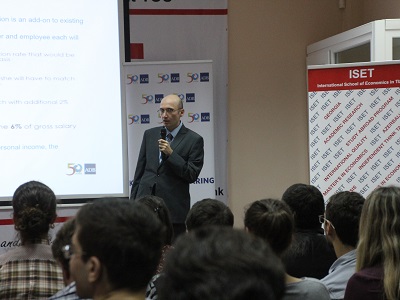Pension Reform in Georgia
- Details

On Monday, October 9th, ISET hosted George Luarsabishvili, Economist at the Georgia Resident Mission of the Asian Development Bank. Mr. Luarsabishvili made a presentation on Pension Reform in Georgia.
Mr. Luarsabishvili first reviewed the current pension system of the country, existing challenges, and the rationale of the reform. He then discussed the details of pension reform in Georgia. The government of Georgia intends to introduce a multi-pillar pension system based on an occupational defined contribution pension, as an add-on to the existing zero pillar, with support from development partners, including ADB, starting in 2018. The objective of the reform is to restructure the existing pension system so that it helps prevent poverty for senior citizens, is affordable for both individuals and society, and is sustainable in the long-term. The reform introduces a supplemental contributory pension savings pillar to provide additional pension income and a more adequate replacement rate, while universal social pensions will become mainly a poverty alleviation tool.
The World’s Ever-increasing Demand for Energy
- Details

In the world of the 21st century, the number of people living without electricity in their homes is 1.3 billion. Even among those who have access, many do not own basic assets such as refrigerators, motorized transport, or washing machines. However, it is anticipated that over the next several decades, wide-scale poverty alleviation programs, as well as continued economic growth, will lift the incomes of many of the world’s poor. As incomes increase, families formerly living in poverty will for the first-time purchase energy-using assets.
How will the global demand for energy rise as a consequence? To answer that question, Dr. Alan Fuchs, Senior Economist in the Poverty and Equity Global Practice of the World Bank, made a presentation at ISET on October 5th.










